Alliance researchers find hopeful signs COVID-19 vaccines will work for long periods, explain how science has contributed to the COVID response, and map the impact of the pandemic on our own workforce. An exciting new diagnostics initiative is announced, a team pursues a new lead to beat diabetes and a study challenges perceptions around an ‘ideal’ body. Overseas, important work impacts on the wellbeing of adolescent girls in Myanmar and we join with colleagues to celebrate the International Day of Women & Girls in Science. Here’s some of the highlights from this week at the Alfred Research Alliance…
MONASH UNIVERSITY CENTRAL CLINICAL SCHOOL
Discovery for turning on cell repair in tissues and organs
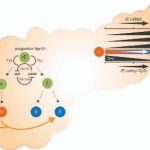 Monash CCS researchers have uncovered the barrier to beta cell regeneration that could pave the way for improved treatments for diabetes and diseases that involve organ and tissue damage, finding that the DNA methylation content of two key developmental genes Ngn3 and Sox 11 were diminished, effectively making them ‘repair’ dormant. The findings may well allow these ‘sleeping beauties’ (stem-like cells) to wake up and become insulin cells to tackle diabetes. Read more…
Monash CCS researchers have uncovered the barrier to beta cell regeneration that could pave the way for improved treatments for diabetes and diseases that involve organ and tissue damage, finding that the DNA methylation content of two key developmental genes Ngn3 and Sox 11 were diminished, effectively making them ‘repair’ dormant. The findings may well allow these ‘sleeping beauties’ (stem-like cells) to wake up and become insulin cells to tackle diabetes. Read more…
World Health Organisation funding will further antifungal stewardship
 Congratulations to Professor Orla Morrissey, Department of Infectious Diseases at Monash CCS who, in collaboration with researchers from the Australasian Society of Infectious Diseases Mycology Interest Group (ANZMIG) and the University of Sydney, was recently awarded funding from the WHO to develop the Fungal Priority Pathogen List (PPL) and describe the research and development antifungal and diagnostic pipeline. Read more…
Congratulations to Professor Orla Morrissey, Department of Infectious Diseases at Monash CCS who, in collaboration with researchers from the Australasian Society of Infectious Diseases Mycology Interest Group (ANZMIG) and the University of Sydney, was recently awarded funding from the WHO to develop the Fungal Priority Pathogen List (PPL) and describe the research and development antifungal and diagnostic pipeline. Read more…
Participants sought for Australian Centre for Blood Diseases research
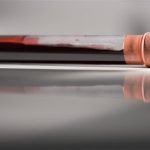 The Australian Centre for Blood Diseases (ACBD) within Monash CCS has recently reopened its research programs and is seeking blood donations. The Centre says its research into blood disorders could not be done without the help of its community of blood donors – so follow the link to find out more about how to contribute.
The Australian Centre for Blood Diseases (ACBD) within Monash CCS has recently reopened its research programs and is seeking blood donations. The Centre says its research into blood disorders could not be done without the help of its community of blood donors – so follow the link to find out more about how to contribute.
Working towards gender equity: Where are we up to for women in science?
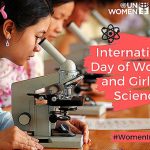 Achieving gender equality and empowering women and girls is the unfinished business of our time, and the greatest human rights challenge in our world, the UN Secretary-General, Mr. António Guterres, stated recently. This call to action was reflected in the International Day of Women and Girls in Science, 11 February 2021, and we took the opportunity to reflect on women in science: how far we’ve come, and how far we’ve got to go. Read more…
Achieving gender equality and empowering women and girls is the unfinished business of our time, and the greatest human rights challenge in our world, the UN Secretary-General, Mr. António Guterres, stated recently. This call to action was reflected in the International Day of Women and Girls in Science, 11 February 2021, and we took the opportunity to reflect on women in science: how far we’ve come, and how far we’ve got to go. Read more…
See how your gut is going – your chance to participate in research
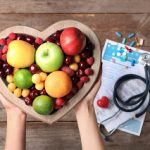
In recent years, there has been an explosion of information about the gut microbiome – the billions of microorganisms that live in our large intestine – with research looking at how what we eat can affect that environment and, possibly, have an impact on blood pressure. If you’re between 18 and 70 years and have a BMI between 18.5 and 35, you could help with this research. Click here to find out more.
Hope for long-term protection by COVID-19 vaccines
 Australian researchers have revealed – for the first time – that people who have been infected with the COVID-19 virus have immune memory to protect against reinfection for at least 8 months. The collaboration led by A/Prof Menno van Zelm from Monash Dept of Immunology & Pathology, with Alfred Research Alliance partners the Burnet Institute & The Alfred, provides strongest evidence that vaccines will work for long periods. Read more…
Australian researchers have revealed – for the first time – that people who have been infected with the COVID-19 virus have immune memory to protect against reinfection for at least 8 months. The collaboration led by A/Prof Menno van Zelm from Monash Dept of Immunology & Pathology, with Alfred Research Alliance partners the Burnet Institute & The Alfred, provides strongest evidence that vaccines will work for long periods. Read more…
To see a perfectly fine body…just look in the mirror!
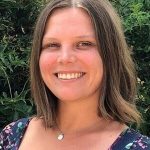 Has the new year made you think about getting a ‘new’ body which reflects the slim, toned and seemingly happy individuals in the weight-loss ads? Dr Gemma Sharp and Nicole Thomas from the Department of Psychiatry have investigated how exposure to a more diverse range of body types affects women’s thinking about the ‘ideal’ body. Read the article by Ellie Aniulus (pictured) here…
Has the new year made you think about getting a ‘new’ body which reflects the slim, toned and seemingly happy individuals in the weight-loss ads? Dr Gemma Sharp and Nicole Thomas from the Department of Psychiatry have investigated how exposure to a more diverse range of body types affects women’s thinking about the ‘ideal’ body. Read the article by Ellie Aniulus (pictured) here…
Mapping the impacts of COVID-19 on the medical research workforce
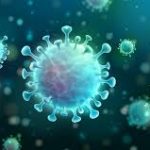 “We’re all in this together” was the rallying call of political leaders talking about the effects of COVID-19 and our responses to it. CCS’s Gender Equity Diversity and Inclusion (GEDI) committee used a survey to map the impacts of the pandemic on CCS’s medical research workforce, discovering both positive and negative impacts on medical researchers, some immediate and some with a much longer tail. Read more…
“We’re all in this together” was the rallying call of political leaders talking about the effects of COVID-19 and our responses to it. CCS’s Gender Equity Diversity and Inclusion (GEDI) committee used a survey to map the impacts of the pandemic on CCS’s medical research workforce, discovering both positive and negative impacts on medical researchers, some immediate and some with a much longer tail. Read more…
BURNET INSTITUTE
A COVID-19 timeline: How science matters
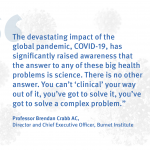 More than a year since it first emerged, COVID-19 continues to present significant health, economic and social challenges. An unprecedented national and global effort in scientific and public health research is underway to find solutions to this devastating virus. Read more about the timeline, rapid response and impact of science – and Burnet’s work – in contributing to the response…
More than a year since it first emerged, COVID-19 continues to present significant health, economic and social challenges. An unprecedented national and global effort in scientific and public health research is underway to find solutions to this devastating virus. Read more about the timeline, rapid response and impact of science – and Burnet’s work – in contributing to the response…
Changing lives in Myanmar – messages of support flow to Ma Sabai
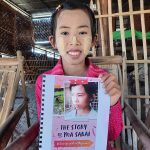 Last year 14-year-old Ma Sabai from Myanmar captured hearts here in Australia when Burnet shared her story about her struggles managing menstruation. Her life changed when, through her school, she was able to access the Burnet Menstrual Health program. Read more about how donations to Burnet’s adolescent health work are making a difference…and how message of support have encouraged this brave young girl
Last year 14-year-old Ma Sabai from Myanmar captured hearts here in Australia when Burnet shared her story about her struggles managing menstruation. Her life changed when, through her school, she was able to access the Burnet Menstrual Health program. Read more about how donations to Burnet’s adolescent health work are making a difference…and how message of support have encouraged this brave young girl
Jennifer Barnes to lead ambitious, new Burnet Diagnostics Initiative
 Experienced biotech executive Jennifer Barnes has joined Burnet Institute as the inaugural Director of the Burnet Diagnostics Initiative (BDI). The bold and ambitious initiative is a multidisciplinary team that will build on Burnet’s long-term capacity for engagement in the point-of-care In Vitro Diagnostics (IVD) industry and its 15-year track record in diagnostic development focused on unmet health needs. Read more…
Experienced biotech executive Jennifer Barnes has joined Burnet Institute as the inaugural Director of the Burnet Diagnostics Initiative (BDI). The bold and ambitious initiative is a multidisciplinary team that will build on Burnet’s long-term capacity for engagement in the point-of-care In Vitro Diagnostics (IVD) industry and its 15-year track record in diagnostic development focused on unmet health needs. Read more…
